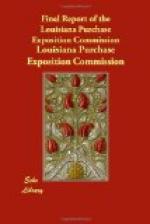not hastening it.”
I have not recited these details for the purpose of claiming that this accelerated speed and advanced position on the part of our Government had any important effect in hastening final results. I have thought it not amiss, however, to call attention to the fact that a century ago the people of this country were not seeking to gain governmental benefit by clandestine approach and cunning pretense, but were apt to plainly present their wants and grievances, and to openly demand such consideration and care from the General Government as was their due under the mandate of popular rule, and that in making their demands they relied on the mutual obligation of the relationship between the governed and those invested with authority, and invoked the reciprocity in political duty which enjoins that for the people’s obedience and support of government, there shall be given in exchange, by the Government to the people, defense of their personal rights and the assurance that in safety and peace they shall surely reap the fruits of their enterprise and labor.
It may also be well to note the efficacy of the people’s call upon the Government in those early days, and how quickly the response came; not by yielding to gusts of popular whim and caprice; not by conferring benefits upon the few at the expense of the many; but by a quick observation of the fact that the withdrawal of certain rightful privilege by another nation from American settlers had caused them distress, and by a prompt determination to relieve their distress, even if the unwelcome visage of war frowned in opposition.
Another incident which, it seems to me, we may recall to-day with profit and satisfaction, grew out of the conduct of the President when the treaty of 1803 had been formulated and was returned to him for ratification and final completion. He was, as is well known, originally quite firm in his belief that the Constitution as it stood did not authorize such an extension of our limits by purchase as the treaty for the acquisition of the Louisiana Territory contemplated. Holding this opinion, and at the same time confronted with the clear conviction that the treaty, with all its stupendous advantages, could not be allowed to fail without positive peril, if not to our national life, at least to its most vital object and aspirations, his perplexity was increased by the receipt of an authoritative intimation that any delay in final action on the treaty might open the way to a recession on the part of France. In these circumstances, not daring to risk the delay of an amendment to the Constitution prior to such final action, he proposed reconciling consistency with duty by procuring confirmation of the treaty by the Senate and compassing its unquestionable validation by a subsequent constitutional amendment.
In view of the conclusive statement, since that time of this constitutional question




